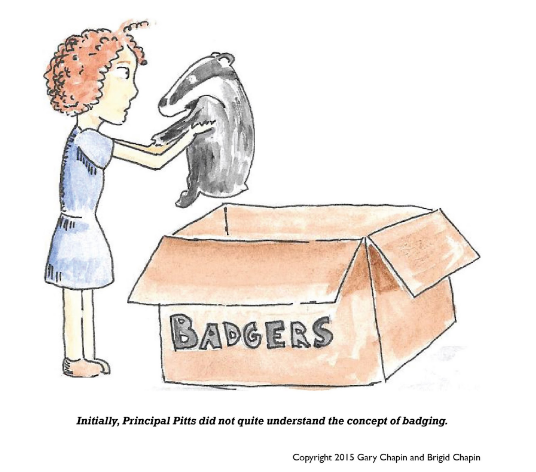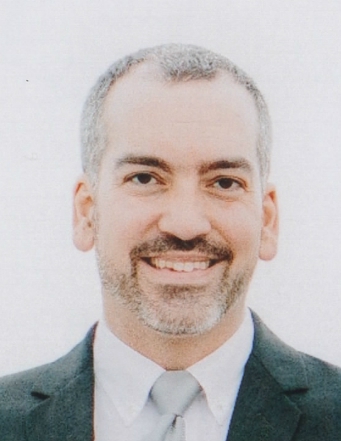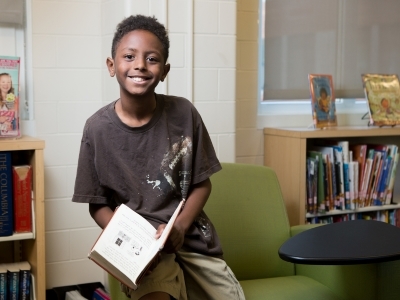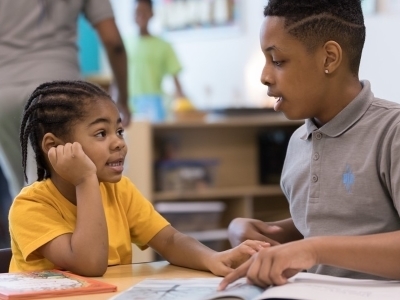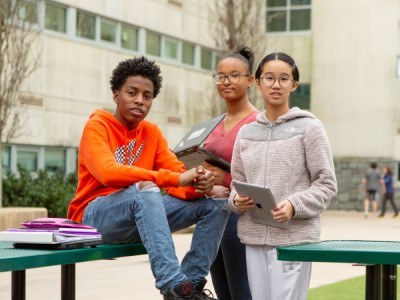From Dinopocalypse to Digital Badges at Del Lago Academy
Topics
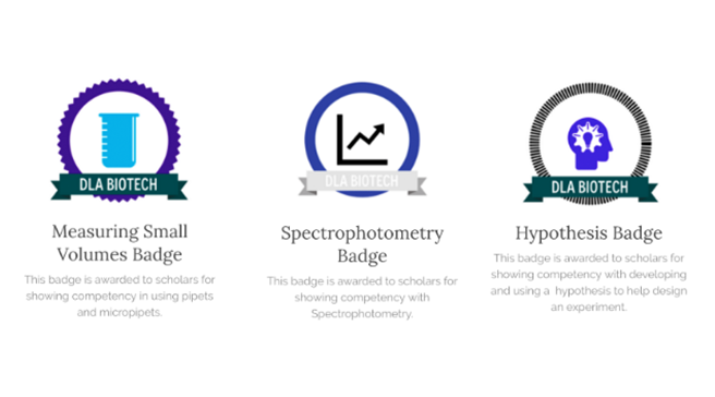
Educators are rethinking the purposes, forms, and nature of assessment. Beyond testing mastery of traditional content knowledge—an essential task, but not nearly sufficient—educators are designing assessment for learning as an integral part of the learning process.
How do people actually learn to be competent scientists? This essential question fueled the collaborative process Del Lago Academy used with students, teachers, and industry partners to create its badging system.
When the science team at the Del Lago Academy (DLA) assigned their scholars the performance task of designing an experiment related to the Dinopocalypse theory—an explanation of dinosaur extinction that NASA has called “terrifying and nearly unimaginable” though entirely plausible—the teachers made an important discovery. The task required students to integrate knowledge of heat transfer, soil composition, and the effect of extreme temperatures on living organisms. Though the students had the requisite knowledge, many were not able to apply this knowledge in the context of experimental design.
Del Lago Academy - Campus of Applied Science, founded in 2013, is a high school in Escondido, CA, created to “engage scholars in real-world learning in order to prepare them better for success in college and career.” As a school focused on applied science, DLA was designed around the Next Generation Science Standards (NGSS) for Science & Engineering, with interdisciplinary projects and biotech industry internships at the center of the academic program. But as the DLA team reflected on how to support students to transfer knowledge and engage in scientific inquiry, they realized that there was a bigger question to answer:
How do people actually learn to be competent scientists?
Competency X
From this question, the Competency X project was born. Competency X, which is supported by the Assessment for Learning Project, is a system of digital badges and learning progressions developed by the DLA science team with biotech industry and higher ed partners, with help from Big Picture Learning. In every science class and project, students will be collecting evidence of learning in a digital portfolio and curating this evidence to earn digital badges. These badges show that students have the requisite skills for various internships, and students are able to earn more badges through real-world learning with industry mentors.
Building a Badging System
Competency X was piloted in 2015-16 by science chair Dr. Alec Barron and fellow science teacher Alyssa Wallace, with badges for Measuring Small Volumes, Spectrophotometry, and developing and testing a Hypothesis. This past summer, Alec led an institute with students, teachers, and industry partners to develop the full set of badges and learning progressions (this great multimedia retelling shows how the institute was structured).
The institute began by posing this question to partners: When students come into your professional context, what skills, knowledge, and dispositions do you want them to have in order to be successful with the tasks you’d assign a new employee or intern?
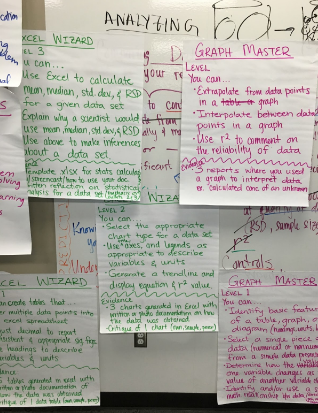
The institute participants worked backward to write outcome statements based on the partners’ responses and code them according to the NGSS. The next step was to sequence the outcomes into draft learning progressions, using the professional experience of partners and the NGSS to identify and fill gaps. Teams of teachers and professional scientists then proposed individual badges as “waypoints” along these learning progressions. The group (including students) spent the rest of the institute workshopping the proposed badges, identifying the evidence necessary to earn a badge, and developing the processes for curating evidence and validating the badges.
Science Practices...And Dispositions!
Having teachers, students, and industry partners face-to-face pushed everyone’s thinking on what matters most for early career scientists. Ahead of the institute, when asked to identify what they wanted to see in new employees and interns, the professional scientists emphasized procedural science skills— for example, being able to run a process called “dissolution testing,” which simulates the rate of release of a drug in the gastrointestinal system. Once everyone was together in person, however, the emphasis shifted toward essential dispositions and general professional skills (which now make up about a third of the total badges). These include badges like “The Receptive Listening Badge” and “The Elevator Pitch Badge.”
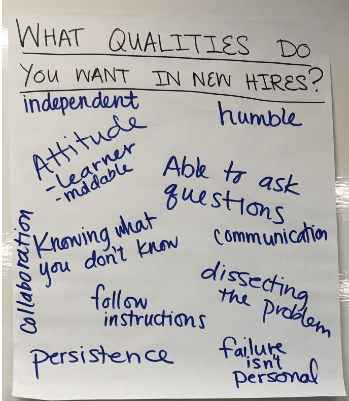
Badges in a Standards-Based System
DLA’s process highlights an important macro consideration about badges. Common academic standards like the Common Core and NGSS are designed to be stable and they take many years and a lot of money to create. Del Lago’s badges, on the other hand, are dynamic. They can easily evolve as technology develops and new kinds of jobs emerge. Moreover, they can be written so as to capture rigorous technical concepts while also using language that makes sense to and motivates young adults. As such, they have the potential to be a valuable complement to the standards—flexible, responsive, and relevant.
The Badges
As shown in DLA’s Badge Progression, the badges are organized into three categories: Experimenting, Analyzing, and Communicating. Some foundational badges are required for all students; others can be pursued based on a student’s individual interests and goals. After the successful pilot last year and the summer institute, the badges will be launched in “beta” at the end of September 2016 with all students. The graphics for the badges are being created by students in DLA’s Principles of Design course and the badges will be iteratively refined in partnership with industry and higher ed partners. The materials provided for each badge explain the expectations for earning the badge, give a rationale for why the practice is important, and specify the evidence required and the validation criteria for the badge. For examples, see the Skeptic Level 1 and Elevator Pitch badges.
Student-Led Learning
The collaborative process DLA used to create Competency X led to some crucial insights that Alec believes will help make the system successful in full implementation. While the badges were initially envisioned as a way to demonstrate readiness for an internship, the industry mentors and students felt it would be even more powerful if internships were also a way to earn additional badges. It’s a subtle shift, but one that’s powerful for cultivating student agency. Whereas initially the badges were in service of the internships, now the internships are in service of students’ individual learning goals (with the badges marking progress along the way).
The institute also led the team to reframe how Competency X will use technology. While there are various commercially available tools for managing badges, teachers wanted to emphasize the collection of evidence and the reflection on learning over the badges themselves. To accomplish this, DLA will use a free blogging platform for the digital portfolio. With their 1:1 iPads, students will continually capture photo and video evidence of their lab work and at the end of each class they’ll write a short blog post describing this evidence. Each badge has been assigned a tag; students will tag their blog posts to show which badge(s) the evidence in that post supports. This means that a single piece of evidence can support multiple badges, emphasizing the interconnectedness (and transferability) of the science practices being demonstrated. Only after this process of collection, reflection, feedback, and curation will the evidence be exported into BadgeList, a program to manage the badges.
Nerdy Delight
During the institute, Alec asked everyone to share an experience that brought “nerdy delight” and got them excited about being involved in science. DLA describes nerdy delight, which perhaps needs no definition, as “that feeling you get when you accomplish something that you did not think was previously possible.” (e.g. “Whoa, I just normalized that wave function!!”)
One of the Assessment for Learning Project team’s favorite sources of nerdy delight is how several ALP projects are creating intentional parallels between student learning and adult professional learning. Just as Competency X is engaging students in scientific inquiry, the DLA science team is approaching Competency X itself as a series of testable hypotheses. As students earn badges and enter into professional science contexts through their internships, Alec and his colleagues will be using the badges as a way to test the learning progressions. They’ll be able to see which path each student took (marked by the badges they’ve earned), and whether that progression in fact prepared the student to be a competent novice scientist. It’s an exciting opportunity to learn more about how competency-based education can be integrated into more traditional school structures.
What Does it Really Take to Become a Scientist?
Nerdy delight is key to understanding how DLA thinks about the badges, which for the most part operate outside of the traditional grading process. One of Alec’s insights from the pilot and from the ISTE Badging Summit he attended is that “badges must be different from traditional assessment practices. The more social and situational they are, the better.”
Competency X is designed to run as a deeply student-led complement to the regular science curriculum, with students choosing the pathway and the pace, and having multiple opportunities for success.
It reflects what is, to me, the most powerful insight that emerged from the conversations between teachers, professional scientists, and students: becoming a scientist is about more than science and engineering practices, crosscutting themes, and core disciplinary ideas (the three dimensions of the NGSS). It’s about the excitement of true inquiry, the satisfaction of exploring abstract ideas using your hands in the lab, and the joy of discovery—intrinsic motivators that Del Lago Academy hopes to capture by putting students in charge of their learning with Competency X.
